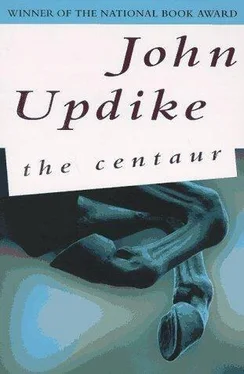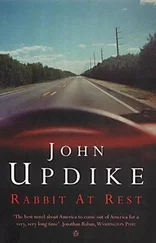John Updike - The Centaurus
Здесь есть возможность читать онлайн «John Updike - The Centaurus» весь текст электронной книги совершенно бесплатно (целиком полную версию без сокращений). В некоторых случаях можно слушать аудио, скачать через торрент в формате fb2 и присутствует краткое содержание. Жанр: Триллер, на английском языке. Описание произведения, (предисловие) а так же отзывы посетителей доступны на портале библиотеки ЛибКат.
- Название:The Centaurus
- Автор:
- Жанр:
- Год:неизвестен
- ISBN:нет данных
- Рейтинг книги:3 / 5. Голосов: 1
-
Избранное:Добавить в избранное
- Отзывы:
-
Ваша оценка:
- 60
- 1
- 2
- 3
- 4
- 5
The Centaurus: краткое содержание, описание и аннотация
Предлагаем к чтению аннотацию, описание, краткое содержание или предисловие (зависит от того, что написал сам автор книги «The Centaurus»). Если вы не нашли необходимую информацию о книге — напишите в комментариях, мы постараемся отыскать её.
In a small Pennsylvania town in the late 1940s, schoolteacher George Caldwell yearns to find some meaning in his life. Alone with his teenage son for three days in a blizzard, Caldwell sees his son grow and change as he himself begins to lost touch with his life. Interwoven with the myth of Chiron, the noblest centaur, and his own relationship to Prometheus, The Centaur one of John Updike's most brilliant and unusual novels.
The Centaurus — читать онлайн бесплатно полную книгу (весь текст) целиком
Ниже представлен текст книги, разбитый по страницам. Система сохранения места последней прочитанной страницы, позволяет с удобством читать онлайн бесплатно книгу «The Centaurus», без необходимости каждый раз заново искать на чём Вы остановились. Поставьте закладку, и сможете в любой момент перейти на страницу, на которой закончили чтение.
Интервал:
Закладка:
They had left a potty by the bed and, kneeling humbly, I used it. Only the medallions of my wallpaper watched. Like a flayed hide stiff with blood my red shirt lay crumpled on the floor against the baseboard. The action of getting out of bed threw into relief my condition. I was weak-legged and headachy and my throat felt glazed with dry glass. But my nose had begun to-run and I could scrape together a small cough. As I resettled myself in bed I relaxed into the comfortable foreknowledge of the familiar cycle of a cold: the loosening cough, the clogging nose, the subsiding fever, the sure three days in bed. It was during these convalescences that my future seemed closest to me, that the thought of painting excited me most and sprang the most hopeful conceptions. Lying in bed sick I marshaled vast phantoms of pigment, and the world seemed to exist as the occasion of my dreams.
My father had heard me get out of bed and he came up stairs. He was dressed in his too-short coat and his imbecile knit cap. He was ready to go, and today my sleepiness wouldn’t hold him back. His face wore a gaiety. “How is it, kid? Boy, I gave you a rough three days.”
“It wasn’t your fault. I’m glad it worked out.”
“Huh? You mean about the X-rays? Yeah, I’ve always been lucky. God takes care of you if you let Him.”
“Are you sure there’s school today?”
“Yep, the radio says they’re all ready to go. The monsters are ready to learn.”
“Hey. Daddy.”
“Huh?”
“If you want to quit or take a sabbatical or something, don’t not do it on my account.”
“Don’t you worry about that. Don’t you worry about your old man, you got enough on your mind. I never made a decision in my life that wasn’t one hundred per cent selfish.”
I turned my face away and looked through the window. In time my father appeared in this window, an erect figure dark against the snow. His posture made no concession to the pull underfoot; upright he waded out through our yard and past the mailbox and up the hill until he was lost to my sight behind the trees of our orchard. The trees took white on their sun side. The two telephone wires diagonally cut the blank blue of the sky. The stone bare wall was a scumble of umber; my father’s footsteps thumbs of white in white. I knew what this scene was-a patch of Pennsylvania in 1947-and yet I did not know, was in my softly fevered state mindlessly soaked in a rectangle of colored light. I burned to paint it, just like that, in its puzzle of glory; it came upon me that I must go to Nature disarmed of perspective and stretch myself like a large transparent canvas upon her in the hope that, my submission being perfect, the imprint of a beautiful and useful truth would be taken.
Then-as if by permitting this inchoate excitement to pass through me I had done an honest piece of work-I went weary and closed my eyes and nearly dozed, so that when my mother brought up my orange juice and cereal I ate with an unready mouth.
IX
ALONE he walked through the white width. His hooves clattered, the fourth scraping (bone against bone), on the limestone plateau, sunstruck from above. Was the dome bronze or iron? From Sky to Earth, they said, an anvil would fall nine days and nights; and from Earth again it would fall nine days and nights and on the tenth day strike Tartaros. In the first days, when Uranus nightly coupled with Gaia, the distance must have been less. Perhaps now it was more, per haps-the thought deepened his sickness-an anvil could fall forever from Sky and never strike Earth. For indeed, was not Mother Ge, who from her damp clefts had once freely brought forth the Hundred-handed, the metal-wielding One-eyed, deep-swirling Oceanus, Caeus and Crius and Hyper ion and Iapetus, Theia and Rhea, Themis and Mnemosyne and gold-crowned Phoebe and lovely Tethys the mother of Philyra; Ge who when watered by the blood-drops of her consort’s mutiliation brought forth the avenging Erinnyes and the gentler Meliai, the shadows of ash-trees and the nurses of Zeus; Ge who brought forth Pegasos from the drops of the Gorgon’s blood and who mating with Tartaros brought forth her youngest and most terrible son Typhoeus, whose lower body was two wrestling serpents and whose arms stretched from sunrise to sunset and who flung whole mountains daubed with his blood and for a time hid the sinews of Zeus himself in a bear’s pelt-was not Mother Ge who had summoned easily from her brown belly such prodigies now tranced by a strange quietude? White, she was white, death’s own color, sum of the spectrum, wherever the centaur’s eye searched. He wondered, Had not the castration of Sky worked a terrible sterility upon Gaia, though she herself had cried aloud for rescue?
The plants by the side of the road he walked were bare of leaves and sparse in variety. Orchard grass the signature of Ceres, sumac the dermal poison, dogwood whose bark was a mild purge, mulberry and pin oak and choke cherry, staple of hedgerows. Sticks. In this season they were barren of virtue and the ground of blank snow made them calligraphic. He searched their scribble for a word and found none. There was no help. There was not one of the twelve he had not consulted and not one had given him the answer. Must he wander forever beneath the blank gaze of the gods? N N The pain in his tissues barked and tore like a penned pack of dogs. Set them free. My Lord, set them free . As if in fury at his prayer there poured through his mind like the foul congested breath of Hekate the monstrous tumble of aborted forms and raging giants that composed the sequence of creation: a ferment sucked from the lipless yawn of Chaos, the grisly All-father. Brug . His wise mind gaped helplessly ajar under this onrush of horror and he prayed now for only the blessing of ignorance, of forgetting. Politic, he had long ago made it his policy to ask of the gods only what he believed they could not help giving. The gates narrowed; he mercifully forgot a little of what he knew.
The scene he had left behind him came to trouble his mind. His child lying fevered. His heart moved in pity for Ocyrhoe, his one seedling, with her wealth of hair. Needed a haircut. Poor kid, heeded everything. Poverty. His inheritance, deskful of debts and a Bible, he was passing it on. Poverty the true last child of Ge. Sky, emasculate, had flung himself far off raging in pain and left his progeny to parch upon a white waste that stretched its arms from sunrise to sunset.
Yet even in the dead of winter the sere twigs prepare their small dull buds. In the pit of the year a king was born. Not a leaf falls but leaves an amber root, a dainty hoof, a fleck of baggage to be unpacked in future time. Such flecks gave the black thatch of twigs a ruddy underglow. Dully the centaur’s litmus eye absorbed this; slowly the chemistry of his thought altered. The intervals between the hedgerow trunks passed him like ragged doorways and he remembered walk ing on some church errand with his father down a dangerous street in Passaic; it was a Saturday and the men from the sulphur works were getting drunk. From within the double doors of a saloon there welled a poisonous laughter that seemed to distill all the cruelty and blasphemy in the world, and he wondered how such a noise could have a place under the sky of his father’s God. In those days he customarily kept silent about what troubled him, but his worry must have made itself felt, for he remembered his father turning and listening in his backwards collar to the laughter from the saloon and then smiling down to his son, “All joy belongs to the Lord.”
It was half a joke but the boy took it to heart. All joy belongs to the Lord . Wherever in the filth and confusion and misery, a soul felt joy, there the Lord came and claimed it as his own; into barrooms and brothels and classrooms and al leys slippery with spittle, no matter how dark and scabbed and remote, in China or Africa or Brazil, wherever a moment of joy was felt, there the Lord stole and added to His en during domain. And all the rest, all that was not joy, fell away, precipitated, dross that had never been. He thought of his wife’s joy in the land and Pop Kramer’s joy in the news paper and his son’s joy in the future and was glad, grateful, that he was able to sustain these for yet a space more. The X-rays were clear. A white width of days stretched ahead. The time left him possessed a skyey breadth in which he swam like a true grandchild of Oceanus; he discovered that in giving his life to others he entered a total freedom. Mt. Ide and Mt. Dikte from opposite blue distances rushed toward him like clapping waves and in the upright of his body Sky and Gaia mated again. Only goodness lives. But it does live.
Читать дальшеИнтервал:
Закладка:
Похожие книги на «The Centaurus»
Представляем Вашему вниманию похожие книги на «The Centaurus» списком для выбора. Мы отобрали схожую по названию и смыслу литературу в надежде предоставить читателям больше вариантов отыскать новые, интересные, ещё непрочитанные произведения.
Обсуждение, отзывы о книге «The Centaurus» и просто собственные мнения читателей. Оставьте ваши комментарии, напишите, что Вы думаете о произведении, его смысле или главных героях. Укажите что конкретно понравилось, а что нет, и почему Вы так считаете.












